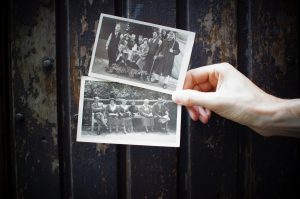Biographers who help people to record their memoirs see firsthand the benefits people get from the process of reminiscing and sharing their life stories. Here are just some of the reasons why …
1) It can help us to understand ourselves better.
‘Know thyself’, Socrates urged. He also said: ‘The unexamined life is not worth living.’ The process of telling our life stories gives people the chance to look back and examine their lives – to acknowledge the milestones, highlights, lowlights, relationships, achievements – where they thrived and where they struggled. Writer Joan Didion put it like this: ‘I write entirely to find out what I’m thinking, what I’m looking at, what I see and what it means. What I want and what I fear.’
2) It can help us find meaning in our lives.
Telling our life stories gives us the chance to make sense of our lives – was a it a good one? Did I do it well? Did I live it fully? Leaving evidence of our lives behind in the form of a written or recorded story is proof that we existed and that perhaps there was some meaning or purpose to our lives. Telling your story can also help validate your life, career and achievements.
3) It can help us to appreciate our lives more.
We may just think we’re leading an ordinary life, because to us it’s just ‘normal’ – but sharing a story and having it witnessed gives us the chance to see it through another’s eyes – and in this way, we can see how we are unique. We may even see that some of the events of our lives were quite unusual, possibly even extraordinary. The process can also bring ‘aha’ moments – where we see the events of our lives with hindsight and perhaps more wisdom.
It’s also a chance to pat ourselves on the back for a life well lived, or for the way we handled a difficult situation, and for what we learned along the way.

4) It can be therapeutic.
Reviewing the past can be cathartic and healing; it can lift mood. Older people often struggle with depression and anxiety, and they might have a fear of death. Telling your life story is a powerful way of helping to ease that.
Reviewing the past can give us a chance to reset the future as well. We can look back and see the difficulties we have overcome, and how we transcended them. And in sharing our stories, others might benefit from seeing how we managed to handle these big issues in our lives as well – and how they might too.
5) It helps us to connect more with the people around us.
Storytelling engages and connects people. It is, in fact, one of our most basic and effective forms of communication. Through story, we can find aspects of ourselves in others, and of others in ourselves.
As Michelle Obama said, “When we share our stories, we are reminded of the humanity in each other. And when we take the time to understand each other’s stories, we become more forgiving, more empathetic, and more inclusive.”
6) It can help people feel a part of something bigger …
Sharing our stories is a wonderful way of connecting the generations, acting as a sort of conversation starter between grandparent and grandchild. This kind of reminiscing can start a dialogue and help to form a bond between the teller and the listener. It’s also good for young people to know where they come from. It encourages a sense of ‘intergenerational self’ – the sense that they belong to something bigger than themselves.
7) It can give us a sense of purpose and help us feel more alive…
Telling our stories can give people a sense that they are making a contribution. People want to feel part of something that extends beyond themselves. Passing one’s memories or experiences on can encourage a sense of purpose. And when we have a sense of purpose, we have a reason to get up in the morning.
Heather Millar, lifestoriesink.com.au



Follow Us